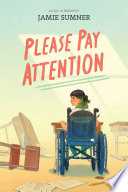Review of Please Pay Attention
 Please Pay Attention
Please Pay Attention
by Jamie Sumner
Intermediate, Middle School Atheneum 240 pp.
4/25 9781665956079 $17.99
e-book ed. 9781665956093 $10.99
In a series of entries in verse, sixth grader Bea Coughlin narrates the story of something important she wants us to “please pay attention” to. Bea tells her story slowly, revealing characters and their relationships in a controlled way that keeps readers intrigued as they put the different pieces together. We eventually learn that she has cerebral palsy, was adopted by Max (her NICU nurse) as a baby, has a penchant for dyeing her hair funky colors and doing magic tricks, and uses a wheelchair. The novel is organized into four sections (“Seek,” “Hide,” “Heal,” and “Hope”) and unfolds starting with “ten days before.” It then counts down to the day a shooter enters Bea’s school. Afterward, she confronts her vulnerability as a wheelchair user, while the steadfast Max provides a much-needed counterbalance: “you are a child, / and that was a tragedy, / and we will get through this together.” She slowly processes the traumatic event through writing, therapeutic horseback riding, and, eventually, activism. In a letter, Bea implores her state’s governor, and indeed all of us, to “please pay attention / and then / act.” An emotionally gripping story about school violence, trauma, and recovery, whose focus on disability and mobility asks important questions about common assumptions and protocols of disaster preparedness and safety.
From the ">May/June 2025 issue of The Horn Book Magazine.

RELATED
ALREADY A SUBSCRIBER? LOG IN
We are currently offering this content for free. Sign up now to activate your personal profile, where you can save articles for future viewing.







Add Comment :-
Be the first reader to comment.
Comment Policy:
Comment should not be empty !!!